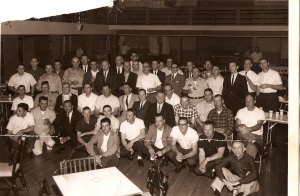Sergeant Major Grandaddy
April 26, 2011 Leave a comment
My Grandfather didn’t join the Army to start a career. As one of thirteen siblings during the Great Depression, he faked his papers at 13 and had deployed to Nicaragua before his cover was blown. After getting shipped back to the States, he got a job at a movie theater and tapped out on school after 6th grade. When he turned 18, he re-enlisted in the Army. He started in the 82nd Airborne Division and rose through the ranks of Non-Commissioned Officers (NCOs) up to a Command Sergeant Major.
Achieving the rank of Command Sergeant Major is the epitome of success for an enlisted soldier, and a great honor. Except for Sergeant Major of the Army, there is no higher grade. If you ask him the secret to his climb through the ranks, he’ll tell you, “I was born in July. We’re natural-born leaders. I guess they just looked at my birth certificate and promoted me. No one ever questioned my background.”
But when you ask him about his time as a Sergeant Major, he beams with pride. A man who regularly forgets the word “vitamin” and often loses his train of thought mid-sentence quickly rattles off 40 different kinds of artillery and explains what it means to resection a map. He was an expert in his field. But knowing your stuff doesn’t get you a leadership position. Even though he claims he has no idea how a guy like him with a 6th grade education earned the respect and trust of his soldiers, his secret becomes crystal clear when he talks about his role as a teacher. He said it best:
What I taught or didn’t teach these guys was life and death. If I didn’t teach someone something they needed to know in combat, they could get killed or get someone else killed. So if I ever saw a guy who was struggling with a subject, I’d spend time with him at night working on it with him til he got it right. If I fell, a thousand guys would fall like dominoes.
He never saw this as a “path to the top,” he was just doing his job to the best of his abilities and making sure those under his charge could too. One trait that seems common across all the leaders I’ve examined as role models is a genuine interest in the success (or in this case, survival) of their people and a willingness to work with them to develop their weaknesses and maximize their strengths. It’s not a life and death situation for most of us, but real leaders always put forth the effort to teach and to mold, and those are the types of leaders we are drawn to.
I could go on for pages about what has made him a role model for me over the last 26 years. His success in the Army is miniscule compared to his success in life. His caring extends beyond teaching, to things like mowing his neighbors’ lawns when they no longer could or taking care of his brother-in-law on his deathbed, even though his brother-in-law never kept it a secret that he didn’t care for him. He never thought of himself as a leader, but I don’t think he ever realized how closely we were watching him, and how little things he did for other people inspired us to do the same.
Instead of ending this post with an introspective thought on how I could apply these lessons in my life, I’d rather simply say: I’m proud of my Grandfather.
